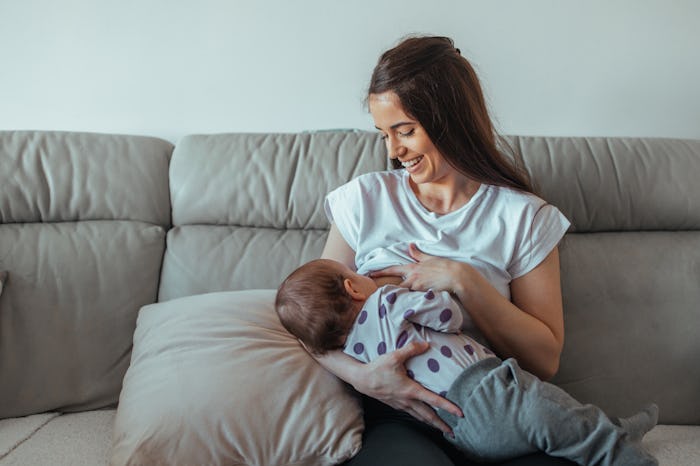Postpartum

Here's The Deal With Biotin & Breastfeeding, According To Experts
Can it really help with postpartum hair thinning?
For all the discomfort of pregnancy, for many it’s also the only time that your hair looks like it could be in a shampoo commercial. Hair looks so full while you’re expecting because rising estrogen levels cause it to shed at a much slower rate. But the flipside to holding onto all this hair is that in the postpartum period, it sheds a ton and often the hair loss is around the temples and hairline so when it begins to grow back it looks like horns. Fun.
As your hormones return to their pre-pregnancy levels, postpartum hair loss is common, but that doesn’t mean you love seeing your luscious pregnancy hair stuck in the shower drain. Many of the hair care vitamins that promise longer fuller hair share an ingredient: biotin. If you’re hoping to hold onto thicker hair after giving birth, you may be wondering, is taking biotin while breastfeeding safe?
Can I Take Biotin While Breastfeeding?
Yes, theoretically you can take biotin while breastfeeding, but it may not be a good or helpful addition to your diet. “Biotin itself is safe in pregnancy. However, supplements are often unregulated and taking unnecessary supplements that could be contaminated is really not a good idea,” Dr. Muneeb Shah, MD (who, with over six million followers on TikTok, you may know as @dermdoctor) tells Romper. “Biotin has not been proven to promote hair growth in anyone unless you are truly biotin deficient, which is very unlikely!” Dr. Shah adds.
So biotin, when taken in the correct dosage, is likely safe… but it probably won’t help that much. “There are some inherited or acquired biotin deficiency where supplementation might be helpful but there is little evidence that biotin helps hair growth in healthy individuals. Biotin is not very effective as a supplement,” Dr. Taraneh Shirazian, OB/GYN and founder of Mommy Matters tells Romper. So if you suspect you have a true biotin efficiency (for example, if one of your parents does you may too), it’s a good idea to consult with your doctor.
You may notice that biotin is in your pre or post-natal vitamin, but that shouldn’t be cause for alarm as long as you clear it with your doctor. It's not in your prenatal so your baby will have flowing hair, though. Rather, some studies show that pregnant women break down biotin at a more rapid rate, which could potentially cause a biotin deficiency in folks who are pregnant or lactating.
Are There Side Effects Of Taking Biotin While Breastfeeding?
Before you reach for the biotin supplement when you’re pregnant or nursing, consider this: “The FDA [issued] a warning recently telling people to be cautious with unnecessary biotin supplementation. Biotin has been shown to interfere with lab tests, including thyroid labs, pregnancy tests, and laboratory markers of cardiac damage,” Dr. Shah tells Romper. “The concern from the FDA was that it could lead people's heart attacks being missed at the hospital due to troponin levels (cardiac damage markers) coming back falsely low due to interference by biotin.” Considering how many lab tests you’ll receive in pregnancy and after, you’ll want to disclose to your doctor if you’re taking biotin.
In addition to abnormal lab results, “the most common complaint when taking biotin is nausea and an upset stomach,” Dr. Alexis Parcells, M.D., tells Romper. “Others have reported increased breakouts.”
Biotin is part of the B vitamin family, which is water-soluble, meaning the body should pee out any excess (as opposed to fat-soluble vitamins A,D, E, and K, which will get stored in fat). While your body should get rid of any excess, it’s still important to note that, “the recommended dietary allowance of biotin for breastfeeding women is 35 micrograms,” Krystal Nicole Duhaney, RN, IBCLC, tells Romper. She adds that taking a biotin supplement might change the taste of your milk. In some rare cases, a drastic change in breastmilk's taste can cause a baby to reject it.
How Can I Get Fuller Hair Postpartum?
So taking biotin while breastfeeding probably isn’t your ticket to fuller hair postpartum (sorry). So what can you do? If patience when it comes to your hair isn’t your strong suit, I totally get it, and the good news is that there are products and dietary tweaks you can try.
“We know that hair thinning after delivery is common, a condition known as telogen effluvium. The hairs are shocked into a resting phase and rapidly fall out. The good news is that this condition itself is limited and corrects itself within a year,” Dr. Joshua Zeichner, MD, tells Romper. This coupled with other factors new parents know all too well (such as stress, low levels of sleep, and highly emotional events, as Dr. Parcells notes,) can also contribute to hair loss.
Zeichner recommends thickening shampoos and conditioners, specifically, Dove Breakage Remedy. “Red light therapy helps encourage delivery of oxygen and nutrients to the scalp to promote healthy follicle functioning,” he adds.
“The best advice is to limit harsh chemicals, stress on the hair (tight ponytails and frequent brushing), and keep the hair hydrated. Additionally, a balanced diet high in vitamin B and iron-rich foods can help with hair growth and strength,” Dr. Parcells tells Romper. If you’re not breastfeeding, minoxidil, a vasodilator found in products like Rogaine may help, per Dr. Shah.
However, all the doctors interviewed stressed that time is really the best remedy for thinning hair postpartum. The condition will repair itself eventually, and parenting is all about patience: with your kids and with your hair.
Experts:
Krystal Nicole Duhaney, RN, IBCLC, founder of Milky Mama
Alexis Parcells, MD, board-certified plastic surgeon, owner of Parcells Plastic Surgery and founder of SUNNIE Wrinkle Reducing Studio
Dr. Muneeb Shah, MD, dermatologist
Taraneh Shirazian, OB/GYN and founder or Mommy Matters
Joshua Zeichner, MD, dermatologist in NYC
This article was originally published on